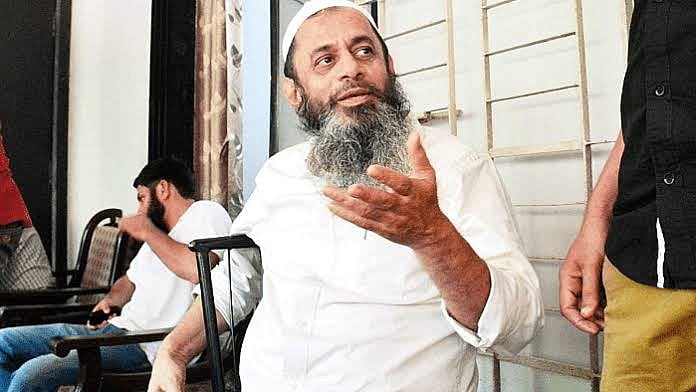
Saquib Nachan
Credit: X/@theskindoctor13
Mumbai: Notorious terror operative Saquib Nachan, the key accused in the Delhi-Padgha ISIS terror module case, died while undergoing treatment at Deendayal Upadhyay Hospital in Delhi days after he suffered a brain stroke while in the Tihar Jail.
Nachan was 65.
Nachan, a Konkan-Muslim, hails from the Borivali-Padgha in the Bhiwandi tehsil of Thane district, neighbouring Mumbai.
In 2023, Nachan was again arrested for what the National Investigation Agency described as self-assumed rights of administering the 'bayath' - oath of allegiance towards the Khalifa of ISIS to persons joining the group. Besides, investigations have revealed that the accused had self-declared the village of Padgha as a “liberated zone” and as 'Al Sham’ like Syria.
This was referred to as the Delhi-Padgha ISIS terror module case.
Having travelled to Pakistan and Afghanistan to build a network with people inimical to interests of India and being convicted twice, Saquib Nachan comes to the focus of police, intelligence agencies and security apparatus - time and again in the last four decades.
Mohammed Saquib Abdul Hamid Nachan has multiple identities like Raveesh alias Saquib alias Khalid.
Over the years, he has been linked to Khalistani terrorists, Pakistani spy agency Inter Services Intelligence (ISI) and the Students’ Islamic Movement of India (SIMI) and Islamic State (IS).
Nachan's name came up again after the Anti-Terrorism Squad of the Maharashtra police along with the Thane Rural police raided Nachan’s home in Borivali-Padgha on Monday - an important development in the wake of the Pahalgam terrorist attack on tourists and Operation Sindoor.
In his student days, he was associated with the now banned Students Islamic Movement of India (SIMI). In his early days, he came in touch with Chenaparambil Abdulkhader Muhammad Basheer alias CAM Basheer, an extremist and radical, who hails from Kerala.
In his early days, it is alleged that he had travelled to Pakistan and Afghanistan and alongside Afghan Mujahideen fought against the Soviet forces in the eighties.
For the first time, Nachan was convicted in 1992, along with Khalistani operative Lal Singh, who was tasked for running Operation K2, which stands for Kashmir-Khalistan. However, on completion of the sentence, he was released in 2001.
Between December 2002 and March 2003, he came to the focus once again when he was arrested for three that had taken place at the McDonald’s joint at the Mumbai Central railway station on December 6, 2002 (22 injured), at the market outside the Vile Parle suburban station on January 27, 2003 (30 injured), and inside a compartment of a local train that exploded at the Mulund railway station on March 13, 2003 (13 killed and over 80 injured).
In a combined chargesheet filed in the Mulund, Vile Parle and Mumbai Central blast cases, police have charged the accused with offences under POTA, Explosive Substances Act and offences of `preparation to wage war against the nation' and criminal conspiracy under the Indian Penal Code against Nachan, who was the accused no. 1 in this case. He was convicted and sentenced for 10 years rigorous imprisonment, which he has completed.
Nachan was arrested in 2002 in connection with the murder of Bajrang Dal activist Lalit Jain at Bhiwandi in the district. However, he was acquitted in the case in 2006 for want of evidence.
Nachan was also arrested in August 2012 in connection to an attempted murder of Vishwa Hindu Parishad activist Manoj Raicha, who was associated with Gowvansh Sanrakshan Samiti. He was released on bail in August 2014.